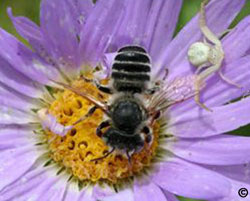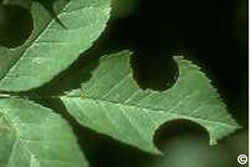 Solitary bees are very common in Colorado (~950 species!) but seldom noticed. Ninety percent of bee species are solitary types including leafcutter, digger, sweat and carpenter bees. These bees are seldom seen because of their habits and in some cases fast movements.
Solitary bees are very common in Colorado (~950 species!) but seldom noticed. Ninety percent of bee species are solitary types including leafcutter, digger, sweat and carpenter bees. These bees are seldom seen because of their habits and in some cases fast movements.
Are there queens in solitary bee colonies?
There is no queen bee and therefore every female is fertile. There are no workers for these species, as essentially laying females act as both a worker and queen in and of herself. Solitary bees typically do not produce honey or beeswax on a harvestable scale.
What do females do in solitary bee colonies?

Female solitary bees prepare their own nest in the ground, in cracks or crevices in walls or in wood. More than likely, a homeowner would notice the signs of their presence rather than the bee itself. An example is the circular leaf section removed by leafcutter bees. The leafcutter bee uses the leaf pieces to line her nest. Once the female has built her nest, she provisions it with a mixture of pollen and nectar and lays her eggs on the food. The egg hatches into a tiny grub that consumes the food over the period of a week or two, and then pupates.
What do solitary bees look like?
Solitary bees come in many different sizes, colors and shapes. They vary in color from basic black to bright metallic green, blue or red. Metallic blue or green sweat bees are known for their habit of licking sweat from people or animals, they also gather pollen to provide for their offspring. The female bees create chambers within the soil where they lay eggs on the pollen balls. Because they don’t have a large nest with a lot of offspring to defend, solitary bees tend to be less defensive than bees that live in groups (or ‘social bees’).
Are solitary bees aggressive?
Although most female solitary bees are capable of stinging, they are not normally aggressive and control measures are usually unnecessary. Solitary bees are considered beneficial because they pollinate both crops and native plants. Leafcutter bees are considered to be a more effective pollinator of alfalfa than are honeybees. Unless someone is allergic to bee stings, homeowners should not be concerned if they find a few solitary bees nesting in their yard.
For more information, see the following Planttalk Colorado™ video(s).
For more information, see the following Colorado State University Extension fact sheet(s).
For more information, see the following Planttalk Colorado™ script(s).



